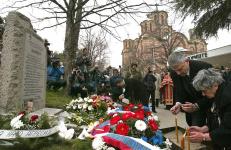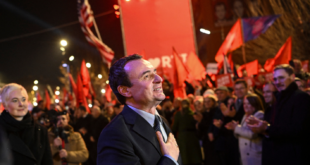 Air-raid sirens wailed on Tuesday as Serbia marked ten years since NATO’s bombing campaign against the regime of late president Slobodan Milosevic to halt its violent Kosovo crackdown.
Air-raid sirens wailed on Tuesday as Serbia marked ten years since NATO’s bombing campaign against the regime of late president Slobodan Milosevic to halt its violent Kosovo crackdown.
Solemn ceremonies were held at Belgrade monuments to children and journalists killed in the NATO sorties as the sirens were sounded across the ex-Yugoslav republic for 60 seconds from midday (1100 GMT).
Ministers gathered at the same time to lay wreaths at spots where people were killed during the air war — at the time the biggest military operation in NATO history.
“The attack on our country was illegal, contrary to international law, without a decision by the United Nations” Security Council, Prime Minister Mirko Cvetkovic told a special commemorative sitting of his cabinet.
“The air strikes have not solved problems in Kosovo, and did not help to bring peace and the rule of law. On the contrary, they resulted in ethnic cleansing and gross violations of human rights, international standards and fresh tensions,” he said after schools held a minute’s silence before class.
NATO launched the strikes on March 24, 1999 after Milosevic refused to sign up to a peace deal to end his forces’ crackdown on the rebel Kosovo Liberation Army, KLA, and the ethnic Albanian majority in the southern territory.
It set out to destroy military targets, and went on to strike infrastructure and the Milosevic propaganda machine. Some strikes went astray, hitting scores of civilian sites and even China’s embassy in Belgrade.
Milosevic eventually conceded 78 days later, paving the way for NATO to enter Kosovo.
Some 15,000 NATO-led peacekeepers remain in Kosovo, which 56 nations recognise after its ethnic Albanian-dominated parliament declared unilateral independence from Serbia 13 months ago.
As part of the commemorations, the bells of Orthodox churches are to be tolled for the victims at 1945 (1845 GMT), the moment NATO’s first attacks were launched 10 years ago.
Separately, a hardline nationalist group plans to stage an anti-NATO rally in the main square of Belgrade, according to posters that have gone up around Serbia’s capital.
“Better war than NATO” membership, say some of the posters seen in underground passageways of the city, where similar protests against Kosovo’s formal secession from Serbia turned violent last year.
Human Rights Watch put the civilian death toll from the bombing campaign at around 500.
But Milosevic’s government estimated that the NATO strikes killed more than 1,000 soldiers and 2,500 civilians, including 89 children, while 12,500 people were wounded and at least 30 billion dollars in damage was caused to its infrastructure.
Health concerns also remain about the danger to civilians from weapons NATO used during the campaign.
Thousands risk life and limb from cluster bomblets still scattered across Serbia as well as from depleted uranium, according to European non-governmental groups.
Many analysts contend the “humanitarian intervention” was necessary to prevent any recurrence of events like the 1995 Srebrenica massacre by Bosnian Serbs of some 8,000 Muslims, Europe’s worst atrocity since the Second World War.
Up to 9,000 people were killed in Kosovo’s 1998-1999 conflict, most of them ethnic Albanians.
In 2006, Serbia joined NATO’s Partnership for Peace programme, a framework for practical cooperation with countries aspiring to join NATO but Belgrade has yet to take any steps to join the alliance.
 Eurasia Press & News
Eurasia Press & News



